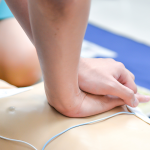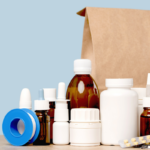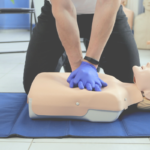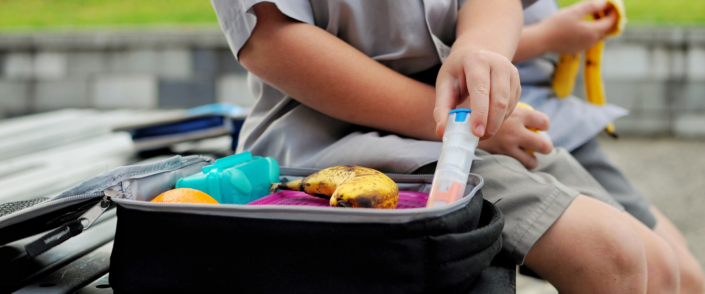As schools have started in January, it is important that CPR and First Aid training is in place to ensure a safe return.
It is vital that the school staff receive full CPR and First Aid training and are confident and are competent and most importantly, are up-to-date with their training.
At Survival CPR we make it so easy for school teachers to learn CPR and First Aid, as our instructors come to the school to teach, in this way, everyone receives the same training and is consistent in how to handle an emergency at the school. It is important that all staff, including school grounds staff and supervisors receive professional training. In this way they are confident to give immediate first aid to someone who is choking, or experiencing an anaphylactic reaction.
It is vital that medication is only administered by staff competent to give it, you must discuss this independently with the school your child attends. In addition, there must be written medical instructions and consent from the parent or legal guardian.
There are many children who attend school with chronic and complex medical conditions. It is therefore essential that school staff work with parents, so that these children are given all the support they need.
Please read here what topics are covered in our Teacher CPR and First Aid Courses.
These are some of the emergencies that children with medical conditions can encounter:
Anaphylaxis
Anaphylaxis is an extremely severe allergic reaction. Reactions usually begin within minutes and progress rapidly, however, they can occur up to 2-3 hours after exposure. In addition, exercise can initiate symptoms a while after exposure to an allergen. Common allergens include food and insect stings. Importantly, the rise of food allergies poses a significant risk for pupils in schools.
Statistics show that children who have a food allergy have reactions that can happen at school. Anaphylaxis can proceed rapidly. In turn, failure to administer adrenaline promptly has been associated with fatalities.
It is really important that parents have ordered additional adrenaline injectors. In addition, teachers must know what to do in case of a medical emergency.
Seizures
A seizure is the medical term for a fit or convulsion. One in twenty people will have a seizure at some point in their lives.
Firstly, electrical activity happens constantly in our brains and controls movements and bodily functions. If there is a disruption to the blood supply to the brain, it can trigger a seizure causing uncontrolled movement of the eyes, limbs and body.
Febrile convulsions can happen to five out of every 100 children under the age of six years old and so are not uncommon.
These are seizures caused by a rising temperature when they are unwell. As a result, seizures are extremely frightening, however these ones are rarely life threatening. Moreover, your child is likely to grow out of them by the time they are about 5 years old. It is important to receive medical advice from your family doctor if your child experiences a seizure, to discover what caused it.
Our instructors are highly experienced medical professionals with experience in ICU, Trauma and Paediatric Trauma. Our courses cater for groups or individuals at our venue or yours.

Nanny and Childminder CPR and First Aid Course
Nanny / Childminder CPR & First Aid Course As a parent, it is important that the person looking after your child has the skills to handle an emergency at home. Whether your child is in the care of a nanny or childminder, it’s crucial to ensure they are equipped with

Online Baby & Child CPR and First Aid Course
Online Baby And Child CPR And First Aid Course Empower yourself to handle emergencies with our comprehensive Online Course. Perfect for new and expectant parents, grandparents, childminders, and anyone caring for young ones. Learn crucial First Aid skills and lifesaving CPR techniques led by owner and founder of Survival CPR®,

BLS (Basic Life Support) Course
Basic Life Support Course This American Heart Association Course is designed for medical professionals (physiotherapists, chiropractors, homeopaths, doctors, nurses, dentists, pharmacists etc), who are registered with the Health Professions Council of South Africa. Course Cost Members of the public are also allowed to attend this Course R 1450 Acquire10 CPD

Pre-School to High School CPR and First Aid Courses
Pre-School to High School CPR and First Aid Courses Ensure the safety of young lives with our comprehensive CPR and First Aid Course. This vital training is tailored to the unique needs of Preschool, Primary School, and High School staff, empowering them to respond effectively to accidents and medical emergencies.

Safe Administration and Storage Of Medications In Schools
Safe Administration and Storage Of Medications In Schools Course This course is tailor-made for the school setting, educators and affiliated staff. You will also learn how to handle certain emergency situations as well as life saving CPR skills. This course is a must for all schools. Enrol now to gain

Level 1 First Aid Course
Level 1 First Aid Course Any workplace with more than ten employees must have a trained first aider and first aid supplies on the premises, according to the Occupational Health and Safety Act. We offer you a First Aid accredited Course. Course Cost accredited by HWSETA and aligned to Unit

Caregiver Course
Caregiver Course Are you passionate about helping others? Our Caregiver Course equips you with the skills and knowledge needed to provide compassionate care to a diverse range of individuals, including babies, the elderly, patients with Alzheimer’s or dementia, the terminally ill, paraplegic individuals, stroke survivors, and so much more. Course

The Importance of learning First Aid if your child has a brain injury
As parents, our greatest wish is to provide our children with a safe and nurturing environment, ensuring they have the opportunities and care we may not have experienced ourselves. We navigate through their milestones, holding their hands as they learn to walk, climb, and explore the world around them. However,

The Importance of Learning CPR and First Aid for Teenagers
As parents, learning CPR and first aid is not just about personal readiness; it’s a powerful tool in ensuring the safety and well-being of our adolescent children. Here’s why it’s crucial for parents to acquire these life-saving skills for their teenage children. Sister Catherine writes about the importance of learning


